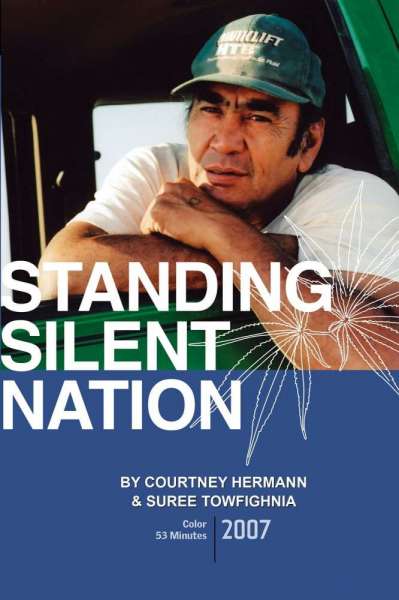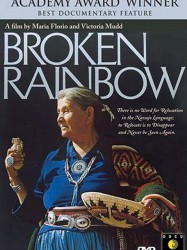Standing Silent Nation est un film de genre Documentaire
Standing Silent Nation (2006)

Si vous aimez ce film, faites-le savoir !
- Infos
- Casting
- Infos techniques
- Photos
- Vidéos
- Passages TV
- Citations
- Personnages
- Musique
- Récompenses
Genres Documentaire
Themes L'environnement, Documentaire sur le monde des affaires, Documentaire sur le droit, Documentaire sur l'environnement, Documentaire sur une personnalité
Note72%










Standing Silent Nation is a 2006 documentary film about Alex White Plume, an industrious resident of South Dakota's Pine Ridge Reservation. After a great deal of research, Alex and his family planted industrial hemp, under the incorrect assumption that tribal sovereignty laws would allow the production of this non-psychoactive relative of marijuana, and the film details the consequences of his actions.
Standing Silent Nation was directed by Suree Towfighnia and aired as part of PBS's Point of View series in 2007.
Commentaires
Postez un commentaire :
Suggestions de films similaires à Standing Silent Nation
Il y a 8965 ayant les mêmes genres cinématographiques, 3804 films qui ont les mêmes thèmes (dont 6 films qui ont les mêmes 5 thèmes que Standing Silent Nation), pour avoir au final 70 suggestions de films similaires.Si vous avez aimé Standing Silent Nation, vous aimerez sûrement les films similaires suivants :

海と夕陽と彼女の涙 ストロベリーフィールズ (2006)
, 1hOrigine Israel
Genres Drame, Documentaire, Fantasy
Thèmes Afrique post-coloniale, L'environnement, Religion, Documentaire sur le monde des affaires, Documentaire sur le droit, Documentaire sur l'environnement, Documentaire sur la guerre, Documentaire historique, Documentaire sur une personnalité, Documentaire sur la politique, Documentaire sur la religion, Politique, Religion juive
Acteurs Mitsuki Tanimura, Yuria Haga
Strawberry Fields points out that strawberries grown in Gaza are the only agricultural product marketed internationally as being of Palestinian origin. One of the major Gaza strawberry farms in located at Beit Lahiya. More than 1,500 tons of strawberries are exported from Gaza to Europe through the Israeli company Agrexco. In order to get overseas, however, the fruits need to pass through the checkpoint that separates Israel and Gaza. The 2005–2006 growing season coincided with the Israel's disengagement from Gaza and the rise of Hamas as the ruling political entity. The armed conflict between Israel and Hamas resulted in the closing of the border checkpoint. The strawberries grown at Beit Lahiya cannot leave Gaza, resulting in significant losses for the farmers and their Agrexco partners. Unable to transport their produce, the farmers have no choice but to dispose of their crop and prepare for the following year’s growing season.

Mugabe et l'Africain blanc (2009)
, 1h30Origine Royaume-uni
Genres Documentaire
Thèmes Afrique post-coloniale, L'environnement, Le racisme, Documentaire sur le monde des affaires, Documentaire sur la discrimination, Documentaire sur le droit, Documentaire sur l'environnement, Documentaire sur une personnalité, Documentaire sur la politique, Politique
Note76%





En 2008, Mike Campbell – l’un des derniers fermiers blancs au Zimbabwe face au violent programme de réforme agraire – prend le risque sans précédent d’attaquer le Président Robert Mugabe devant le tribunal du SADC (Communauté de Développement Sud-Africain) afin de défendre ses droits. Son exploitation agricole emploie plus de 500 travailleurs et abrite également leurs familles. Mike Campbell accuse Mugabe et son gouvernement de discrimination raciale et de violation des Droits de l’Homme. Embarqués dans un procès hors du commun, Mike et sa famille vont devoir faire face à la violence et à la cruauté du régime du dictateur. Ce documentaire retrace leur combat.

The Return of Navajo Boy (2000)
, 52minutesOrigine Etats-Unis
Genres Documentaire
Thèmes L'environnement, Documentaire sur le monde des affaires, Documentaire sur le droit, Documentaire sur l'environnement, Documentaire sur le nucléaire, Documentaire sur une personnalité, Documentaire sur les technologies
Note26%






Broken Rainbow (1985)
, 1h10Origine Etats-Unis
Genres Documentaire, Historique
Thèmes L'environnement, Documentaire sur le monde des affaires, Documentaire sur le droit, Documentaire sur l'environnement, Documentaire historique, Documentaire sur une personnalité, Documentaire sur la politique, Politique
Acteurs Buffy Sainte-Marie, Dennis Banks, Martin Sheen, Burgess Meredith
Note67%






The Dark Side Of Chocolate (2010)
Origine Danemark
Genres Drame, Documentaire
Thèmes L'enfance, L'environnement, Esclavagisme, Documentaire sur le monde des affaires, Documentaire sur le droit, Documentaire sur l'environnement, Documentaire sur une personnalité, Documentaire sur la maltraitance des enfants, Maltraitance des enfants
Note74%





In 2001, the Chocolate Manufacturers Association formed an action plan entitled the Harkin-Engel Protocol aimed at ending child trafficking and slave labor in the cocoa industry.

The Harvest (La Cosecha) (2011)
, 1h20Origine Etats-Unis
Genres Documentaire
Thèmes L'enfance, L'environnement, Le monde du travail, Documentaire sur le monde des affaires, Documentaire sur le droit, Documentaire sur l'environnement, Documentaire sur une personnalité, Documentaire sur la politique, Documentaire sur la maltraitance des enfants, Politique, Maltraitance des enfants
Note69%






Zramim Ktu'im (2010)
, 1h15Origine Israel
Genres Documentaire
Thèmes Afrique post-coloniale, L'environnement, Religion, Documentaire sur le droit, Documentaire sur l'environnement, Documentaire sur la guerre, Documentaire historique, Documentaire sur une personnalité, Documentaire sur la politique, Documentaire sur la religion, Politique, Religion juive
Paths of lives are crossed in one village in the West Bank. Along the broken water pipelines, villagers walk on their courses towards an indefinite future. Israel that controls the water, supplies only a small amount of water, and when the water streams are not certain nothing can evolve. The control over the water pressure not only dominates every aspect of life but also dominates the spirit. Bil-in, without spring water, is one of the first villages of the West Bank where a modern water infrastructure was set up. Many villagers took it as a sign of progress, others as a source of bitterness. The pipe-water was used to influence the people so they would co-operate with Israel’s intelligence. The rip tore down the village. Returning to the ancient technique of collecting rainwater-using pits could be the villagers’ way to express independence but the relations between people will doubtfully be healed.

Wiebo's War (2012)
, 1h33Origine Canada
Genres Documentaire
Thèmes L'environnement, La famille, Religion, Le terrorisme, Documentaire sur le droit, Documentaire sur l'environnement, Documentaire sur la guerre, Documentaire historique, Documentaire sur une personnalité, Documentaire sur la politique, Documentaire sur la religion, Documentaire sur les technologies, Documentaire sur le terrorisme, Politique
Note72%






Crude (2009)
, 1h40Réalisé par Joe Berlinger
Origine Etats-Unis
Genres Documentaire
Thèmes L'environnement, Documentaire sur le droit, Documentaire sur l'environnement, Documentaire sur une personnalité, Documentaire sur les technologies
Acteurs Trudie Styler
Note74%





The film follows the progress during 2006 and 2007 of a $27 billion legal case brought against the Chevron Corporation following the drilling of the Lago Agrio oil field, a case described by activists as an “Amazon Chernobyl”.

Food, Inc. (2008)
, 1h34Réalisé par Robert Kenner
Origine Etats-Unis
Genres Documentaire
Thèmes Mise en scène d'un animal, Cuisine, L'environnement, Maladie, Obésité, Documentaire sur la cuisine, Documentaire sur le monde des affaires, Documentaire sur la protection animale, Documentaire sur le droit, Documentaire sur l'environnement, Documentaire sur la malbouffe, Documentaire sur la santé, Le handicap, Politique, Documentaire sur la nature
Note77%





Le film s’inspire de l’essai Fast Food Nation d’Eric Schlosser. Il traite de la production de nourriture à grande échelle aux États-Unis et conclut que la viande et les légumes produits par ce type d’industrie sont mauvais pour la santé et pour l’environnement malgré les messages et l'imagerie présents sur les emballages des aliments. Pour cela l'enquête s'attache sur l'élevage industriel de bovins et d'ovins en interrogeant des éleveurs enchaînés à leurs emprunts dans le but de suivre le cahier des charges des grandes firmes agroalimentaires comme Cargill ou Smithfield Foods ainsi que sur le rôle prépondérant du maïs la plupart du temps maïs génétiquement modifié dans la composition de la quasi-totalité des produits vendus en supermarché aux Etats-Unis et ailleurs dans le monde. Le témoignage d'une mère devenue défenseuse des droits des consommateurs à la suite du décès accidentel de son fils, Kevin Kowalcyk, empoisonné par la bactérie Escherichia coli après avoir mangé un hamburger apporte un argument supplémentaire. Cette famille a obtenu gain de cause avec l'adoption de la Kevin's Law.
 Connexion
Connexion